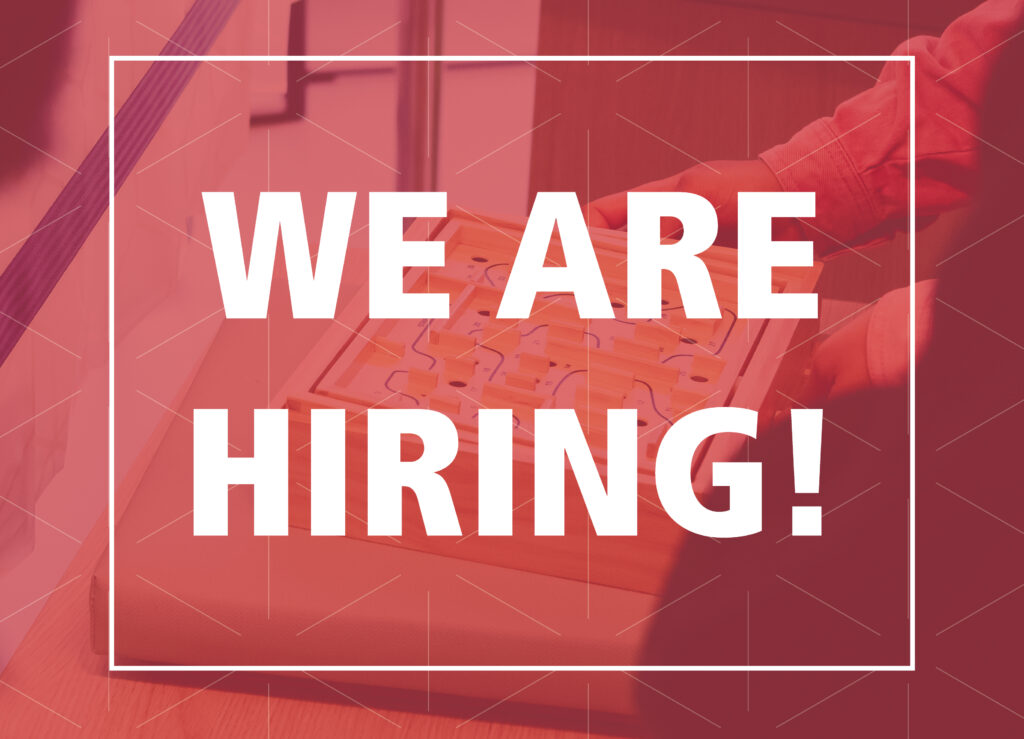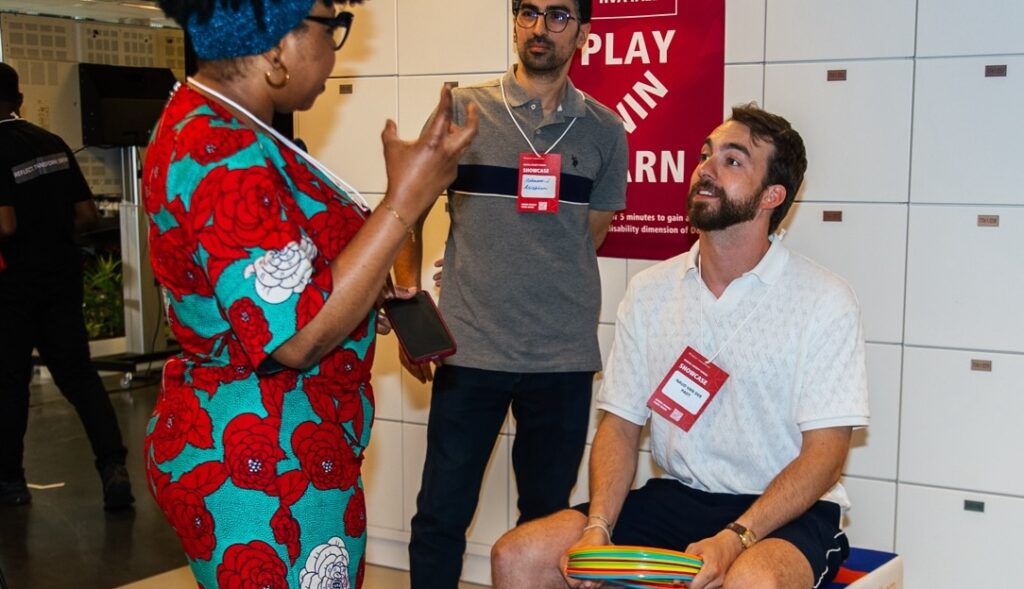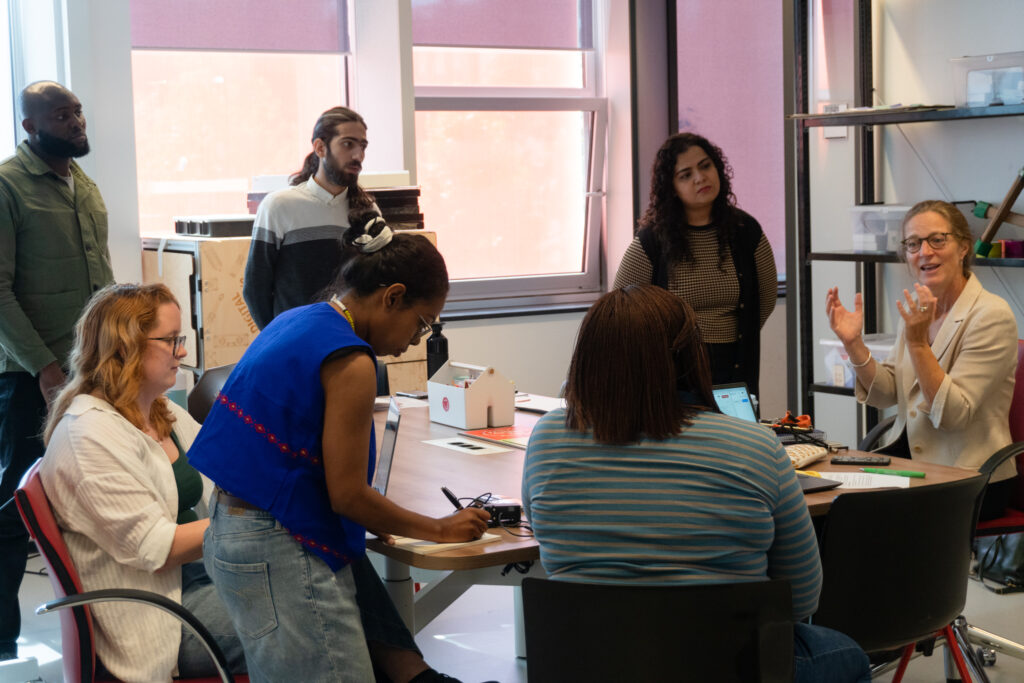Insight
Recap Digital Society School Showcase Fall2018
On the 23rd of January 2018, the first group of Digital Society School teams showcased the work of their intense past 20 weeks. All learners have prepared an event where Digital Society School partners, alumni, community members, family and friends can experience the results from their hard work.
It was a night filled with prototypes, storytelling and community where we got introduced to the process of innovation and design. The results are based on collaboration between our Digital Society School teams of learners and the project partners and organisations that assigned them a complex social challenge to address. The prototypes today are not the only outcome; each team has executed research that sheds new light on the challenges by experimentation, multiple iterations and transformations of the challenge from a vague question to implemented solution. Each team proudly demonstrated their solutions to connect digital technology, society and design to create an impact for the United Nations Sustainable Development Goals.
The other significant outcome is less tangible but even more scalable - the transformation and learning that both the teams and companies are experiencing as part of the process. Our teams built capacity to create the process of digital transformation, innovate with technology and design sustainable and innovative solutions. They have supported their partners to also explore ways to innovate and develop a more sustainable and human-centred mindset.
The Digital Society School would like to express their gratitude towards the Fall2018 partners: Johan Cruijf Arena, VNHC, Climate Cleanup, HvA Facility Services, Exodus Zuid-Holland en Vodafone / Ziggo.
Opening by Marco van Hout, Head Of Programmes & Impact of the Digital Society School
Does transformation tell us about technology or about society? Maybe you have seen the video where children are asked to react to older technologies. The issue with these is that we are making the wrong assumptions about young people. Are they dumb? Are they smart? No, they are up to date. We should stop talking about the things that are broken and start talking about transforming things.
We, as the designers of the future, shape and transform while learning critical skills in the light of digital society together. We use technology for the benefit of society by combining a team of multi-disciplinary talent who are eager to learn and create, and that really makes an impact. Together, the learners of the Fall2018 semester spend 16.000 hours of work and development on not just impacting each other, but also on the global goals from a local, intercultural and global perspective. By having 20 events and 74 cities participating in the annual Global Goals Jam. So to round up, we can say that we have learned a lot. And we would like to keep learning and discovering with our partners by monitoring the state of digital society.
By exploring people’s perceptions and experience with digital technologies and questioning how these develop, we measure the impact these emergent trends will have on the Sustainable Development Goals. It is a way to set the foundations of our impact and keeping ourselves aware of the bigger picture. The Digital Society School wants to help decision making and stimulate actions based on our process, with the evidence that a local community can create evidence of a change in society.
Digital to Physical Track
Gijs Huisman, Senior Track Associate of the Digital to Physical Track, introduces the trends ‘Digital to Physical’ research. As people, we are physical beings. We are embodied and move around in the physical world. Digital technology, once considered another realm to ours, has begun bleeding into our physical life. We can see these examples when we look at new technologies that talk about mixed reality such as Pokemon Go, where the interaction between digital and physical life are present.
In a way, the data that is on the screen starts dictating how we move around in the physical world. Within the ‘Digital to Physical’ track, learners were given three distinct challenges surrounding the topics of inclusivity, participation and sustainability.
For a deeper insight into the design process of the teams: please read their medium blogs.
Team XFOURS
Project team: Roxane de Jong, Anushree Jain, Alec Stewart, Ginger Ultee
Coach: Mick Jongeling
Project Partner: Exodus Zuid-Holland
Each year, around 30.000 people are released from prison in the Netherlands. Over 47% will have a new criminal case in just two years. This cycle of imprisonment is one that the team wanted to break. Their proposed system: RefleXion, a wearable that measures stress, an application and visualisation that helps ex-offenders get more access to their resocialisation process.
The project partner, Exodus, believes it is important to involve participants in the development of future concepts. Throughout the project, the team was given the opportunity to conduct interviews, test prototypes and involve caretakers and volunteers. Exodus nourished a unique experience for the team to develop a tool that caters to the needs of people who are not adapting to use technology as it is to others.
Team Future Farmers
Project team: Joel Ruhe, Anisha Sivakumaran, Maitrayee Sohni, Angelo Moestadja
Coach: Ilaria Zonda
Project Partner: Vodafone Ziggo
It is predicted that around 5.2 billion people live in cities by 2030. This will not only impact the way we live but also how we produce and consume food. Let’s grow our food in cities as well! The current problem area is that people don’t understand the needs of their plant to keep them healthy.
The Smart Growkit, a system of sensors, helps you understand your plants better. We, as a society, can learn how to use technology and understand sustainability better. There is a balance between technology and sustainability and they can co-exist.
Team Omega
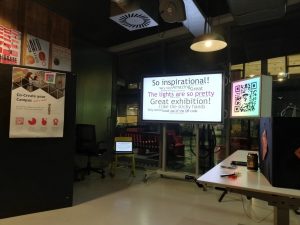
Project team: Max Groen, Prachi Lai, Floris van der Werk, Jessica Nyugen
Coach: Dan Xu
Project Partner: HvA facility services
For the facility services that optimise our experience on the HvA Campus, getting constructive feedback outside of complaint forms is hard. The team set out to playfully engage students to give regular and instant feedback. The emergence of digital life is an opportunity to engage students in campus life. The success of games like Pokemon Go to engage students on the campus is interesting, can new technologies be used for own experiences and combined with user research to create something that visitors would want to use themselves.
The proposed solution is a QR-code that shows the answers to a survey directly in space. Visitors can see quickly what the average feeling of their peers are. The QR-code updates itself with new answers every time a survey is completed, creating a dynamic feedback system that is playful to engage with and can give HvA facility services the feedback that can impact living and working on campus.
Data Transformation Track
Emma Beauxis-Aussalet, Senior Track Associate of the Data Driven Transformation Track, elaborates on the trends ‘Data Driven Transformation’ investigates. The track aims to ensure that society can harness data and create data-driven technologies. But what is getting transformed? Our traditional education systems are getting replaced by machines and data, resulting in different knowledge and different action. And where do we drive data? To create equality, we should use both qualitative and quantitative. We should educate and develop data literacy. Within the ‘Data Driven Transformation’ track, learners were given three distinct challenges surrounding the topics of literacy, inclusivity and storytelling.
For a deeper insight into the design process of the teams: please read their medium blog.
Team Brain Wash
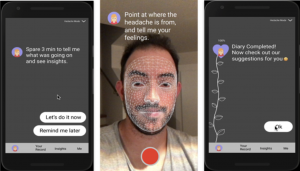
Project team: Merijn Kleinreesink, Immanuel von Detten, Crystal Shan
Coach: Abdo Hassan
Project Partner: VNHC
What does a patient with migraine go through? The aim of this project was to understand the data and communication between patients and doctors. The prototype was all about shredding the amount of paperwork and digitize the data, for improved health.
How would an application help the patients follow their treatment better?
The project partner, VNHC, is lacking hands and time - it is hard to see patients often enough and check on how are they doing. Having a personal assistant in their pocket helps them get the help they need. Smart tools for health care exist but usability might be a challenge. It was interesting to discover the solutions that already exist to record headache attacks. In terms of usability, they were either functional for the doctors for analysis (60 questions every day to provide doctors with data). Now, questions give insight and provide value for both doctors and patients.
Team Innovation Arena
Team members: Nozomi Oka, Seiya Nishida, Dikshant Agarwal, Krassimira Rozendal
Coach: Evelien Christiaanse
Project Partner: Johan Cruijf Arena / Lectoraat Crossmedia
What makes people stay in the moment? When you go to an event at the Johan Cruijf ArenA, what would make you stay there and engage with others?
This semester project explored how to create an inclusive fan experience at one of the most innovative stadiums in the Netherlands. But how can you get people to stay a bit longer after an event by creating a wow moment that fosters a community feeling?
Data can be used to solve efficiency problems, including improving the way people navigate spaces and better feedback systems. But it is important not to forget the experience that makes people stay in the moment. The Hologram can display certain programs, such as questions, karaoke and videos. This will help create a ‘fireplace’ where people can gather and engage with each other.
Team Climate CleanUp
Team members: Namrata Babu, Mokhtar Hussein, Andy Docket
Coach: Carlo de Gaetano
Project Partner: Climate CleanUp
How can diverse stakeholders be engaged in the clean up of the environment? As the problems surrounding climate change have become more and more evident, collective responsibility has been blurred by the number of people involved. The proposed idea aims to unite ideas with entrepreneurs and give them a stage to become visible to offer and develop their solutions.
For Climate CleanUp, stronger partnerships are needed to understand better how elements are connected within the climate change narrative and how visualising these complex relationships can help create the impact needed to positively solve the issues surrounding it.
Thank you all for being a part of this
The showcase was a perfect wrap up to a good first semester of the Digital Society School, where we greeted familiar faces and met new friends. We hope to see everyone in future events and co-create the learning community that will transform the current society and shapes the society of the future that will benefit us all.
We’re very proud of all the end results and the hard work that’s been put into it! To all our friends who joined the Showcase and celebrated the end of our first official Digital Society School Semester, we say: Thank you for being there!
